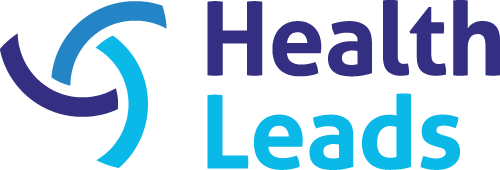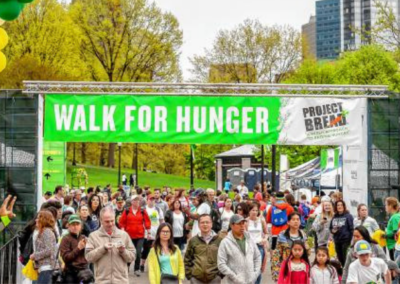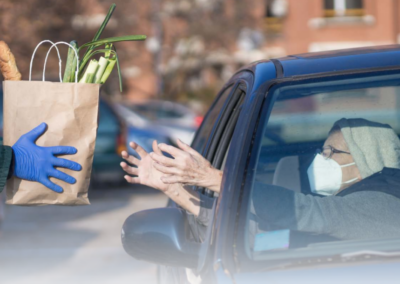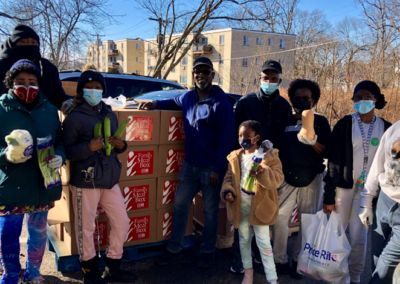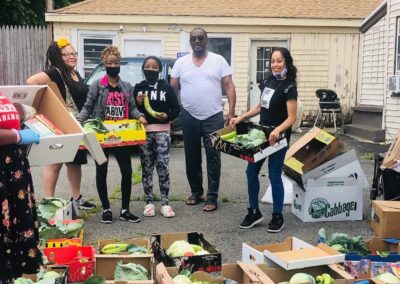Why Local Leadership Matters: How the Boston-based Neighborhood Food Action Collaborative Gets Results
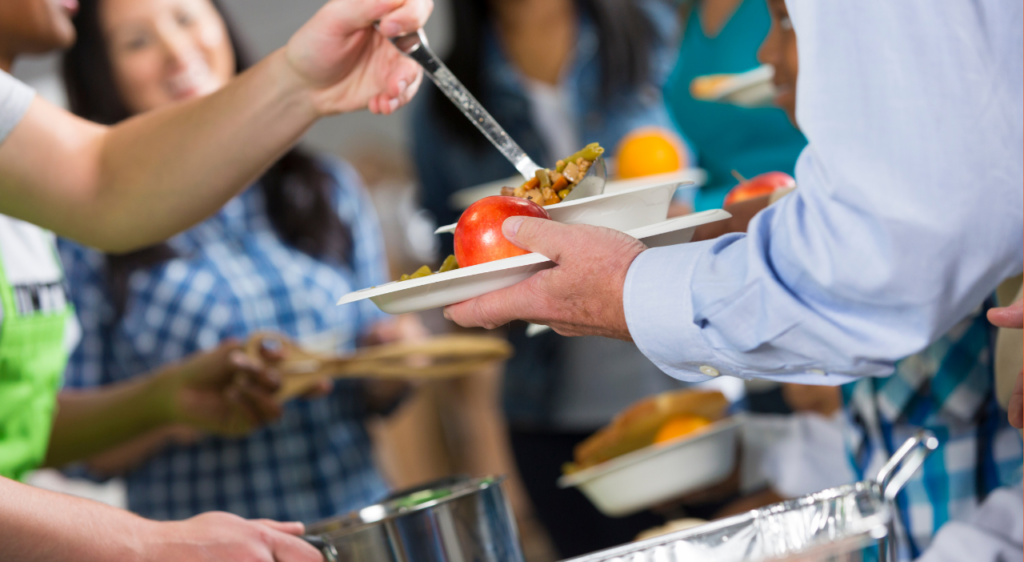
Focusing on local community leaders, particularly those impacted by racism and food insecurity, empowers communities to address these issues effectively. The Neighborhood Food Action Collaborative (NFAC) in Boston operates with a community-centered approach which includes:
- A collaborative platform to amplify community voices for better food access.
- Establishing links between food rescue efforts and food deserts to reduce waste and improve food distribution through NFAC’s programs.
- Weekly, NFAC aids 450+ community members, redistributing 102,000+ pounds of rescued food annually.
- Testifying in front of Congress and advising advocacy groups on how to enhance the local food system and utilize the insights of food insecure individuals.
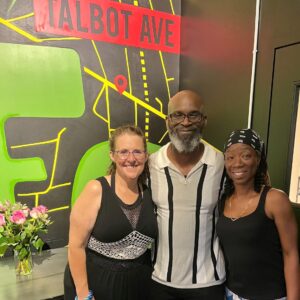
Pictured above in order is Leah Arteaga, Ric Henry, and Sophia Michel.
NFAC Community Leaders, Ric Henry and Leah Arteaga, and Community Member/Peer Advocate, Sophia Michel discuss how their personal dedication to creating sustainable and effective change has improved their communities.
Why did you get involved with NFAC?
Ric: I got involved in this work because it’s for the people, by the people. There is community buy-in – the community is a partner, and their voice is heard equally and justly. It feels good to see the community realize their power, collectively. In the food security world, we are seeing results when the community comes together and creates a plan with organizations supporting us, that gives me motivation to keep going.
Leah: I was so impressed that a group of concerned citizens had decided to band together to make a difference so I said, “where can I sign up?”
Also, my own lived experience motivated me to get involved. Several years ago, I suddenly became a single mother of three, I lost my job, and dealt with food insecurity firsthand. Getting resources and navigating the food assistance system was difficult, and I wanted to be involved with a group who was helping to create change.
Sophia: I’m a mother of three living in Boston, and I got engaged with NFAC because I wanted to know why my neighbors and community were lacking access to food. I loved seeing NFAC step up to support the community as one. This group is led by the community and allows community members to identify the problems and work on solutions that we are creating.
How is NFAC unique compared to other food security efforts?
Leah: We’re doing something that’s extremely unique because it is grassroots. It is the people from the community. It’s the voice of the community. And this is quite a unique model. It’s a sustainable model where people from the community are the ones at the table, at the seat, making decisions and making things happen. It will be the voice of the community serving the community.
Sophia: There has always been a need for more inclusion and support for families who are facing food insecurity and want to be a part of the solution. This group is unique because everyone feels respected and included – our voices are heard.
Ric: We are also unique because we aren’t doing this alone and trying to do everything ourselves. We believe in collaboration and don’t want to duplicate what people are already doing if it is being done well. We partner with organizations like the Greater Boston Food Bank and the YMCA to help bring food to the community and provide them with nutrition education. We also work with Food Rescue US to reduce food waste and reallocate healthy and good food back to the community where people need it most. We work with the Daily Table and the Mayor’s Office of Food Justice to share resources and coupons so community members can get even more access to purchase healthy food. We really believe that if everyone does a little, nobody has to do a lot, and the best way to improve food insecurity is to work together.
What influenced you to take on a leadership role?
Ric: Deciding to take on a leadership role was easy, and it was an honor to do so. NFAC’s governance, mission, vision and community agreements were all created by community members. This gives the community the power they need to make decisions about what is best for them. The community plays a major role in this collaborative. As a matter of fact, the community IS the collaborative. This process ensures that the community gets to be at the center of all decision making and I wanted to help support this work.
Leah: I had been running my own distribution program to reduce food waste and address food insecurity for three years prior to hearing about NFAC. I realized that this was a group of concerned and dedicated citizens who wanted to make an impact on their own community. And I said, “This is where I belong.” I could bring my experience, share my resources, and I could learn from them. I could also become a part of a larger group to make a bigger impact on the community. And I just thought that being a leader would be beneficial. So, I threw my hat in the ring, the community voted me in, and here I am!
How has community leadership been critical in closing the SNAP gap and dealing with food insecurity?
Sophia: We know that it takes trusted community members to reach those most in need and destigmatize utilizing emergency food assistance resources. So we did trainings on SNAP because we wanted to close the gap. In 12 months, we went to about 120 community events around the city so that they’re not scared of us and to let them know what SNAP is all about and we were able to enroll over 300 households.
I helped out a lot of elders who didn’t know what to do or how to apply. We started to fill in the gap by telling them to come meet us, and we’ll walk you through it. But we didn’t forget about them – that’s what tends to happen at the department that oversees SNAP because they have so many cases. So we help people work with them and figure out what else they need to make sure their application is complete.
We noticed the reason why a lot of people didn’t want to participate with SNAP was because of a language barrier and immigration fears. So we tackled working with everybody. We had flyers in English, Haitian Creole, Spanish, Cape Verde, Vietnamese. We touched it. We showed them that you don’t have to be scared. It’s for you guys. We’re not against you.
What advice do you have for those looking to replicate a community-centered response model?
Ric: We’ve learned that we should plan accordingly but need to be flexible and adapt our timeline to meet the needs of the community. We can’t expect that community members will be able to drop everything else in their lives to participate in this work. The people we engage with have full lives with many responsibilities and commitments that may take priority. It is important to try to plan on providing support to community members to alleviate other priorities and increase ease of participation.
Sophia: It’s all about listening, connecting, networking, and putting in real action to make change. If you listen to the community and build a real connection, you’ll be able to establish trust. You can make the change that matters.
Leah: When working with community members, compensation is important because it acknowledges the value of community members’ time, recognizes the value of community members’ expertise, and removes a financial barrier that may otherwise prevent participation.
And celebrate early wins, processes and relationships that will carry forward into future work – this helps with sustainability and burnout.
What do you hope to see for NFAC in the next five to ten years?
Ric: In 5 or 10 years, I see NFAC being completely community driven, community led. A steady flow of funds coming in not just to buy food, but to create and maintain a healthy community that eats well on a budget, advocates for themselves and has a system in place to ensure a flourishing healthy food ecosystem.
I also see a place where we work with the youth to teach them more about community service and getting involved with their community as well as working with other organizations that are creating and shifting policy. Overall, I see a community living healthy and calling their own shots.
Leah: In 5 to 10 years I see us having a location like a community health hub. So not only are we feeding people, but we’re also giving people access to simple things like blood pressure checks, and sugar level checks if they have diabetes or other things like that, maybe even vaccine clinics. The sky is the limit.
Health Leads works to empower communities to develop their own neighborhood food networks that are equipped to increase equitable access to and distribution of food resources via the Neighborhood Food Action Collaborative, which serves Roslindale, Hyde Park, Mattapan, Dorchester, and Roxbury. More information on the Boston Food Ecosystem work can be found here.
